用艺术点亮枯燥生活
许紫莹
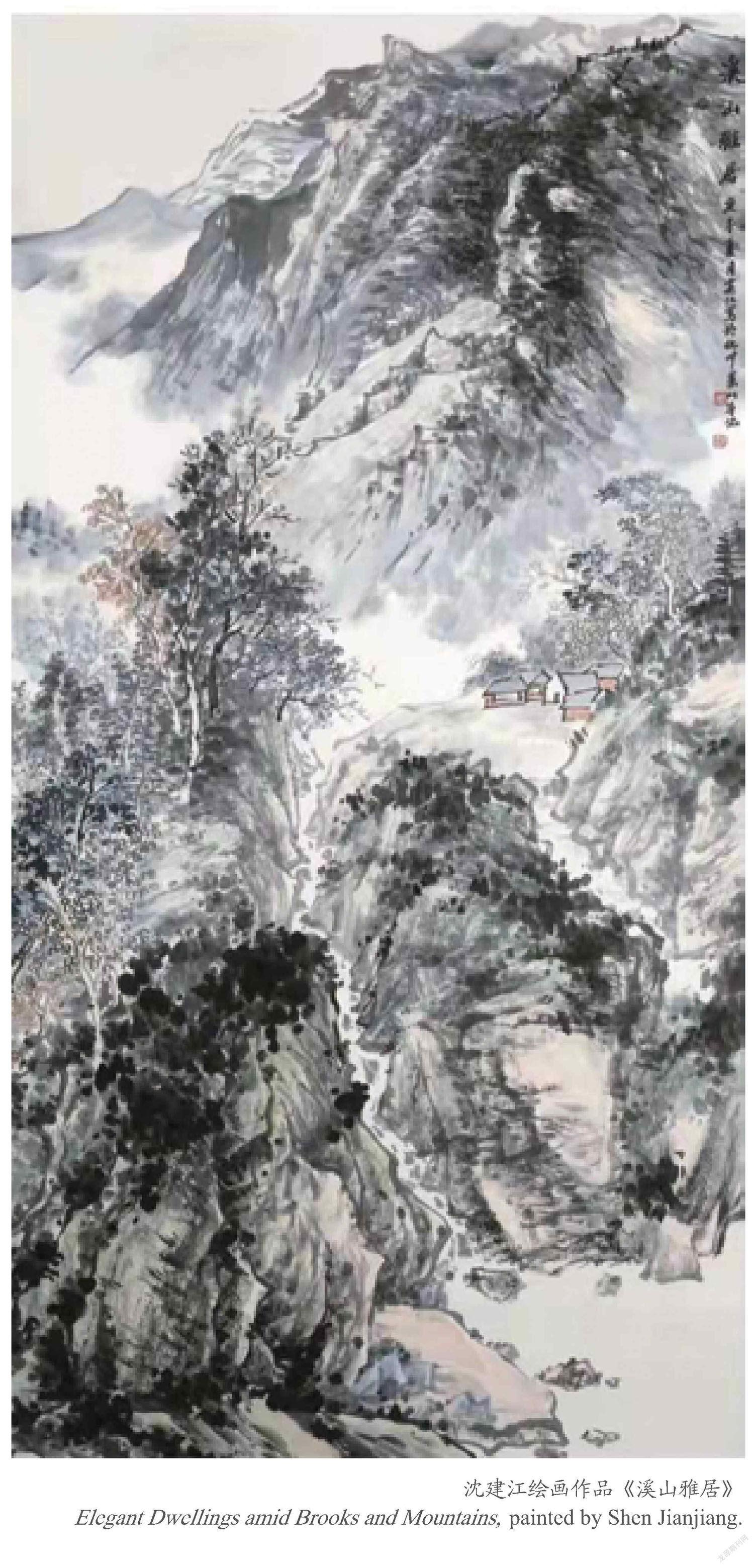
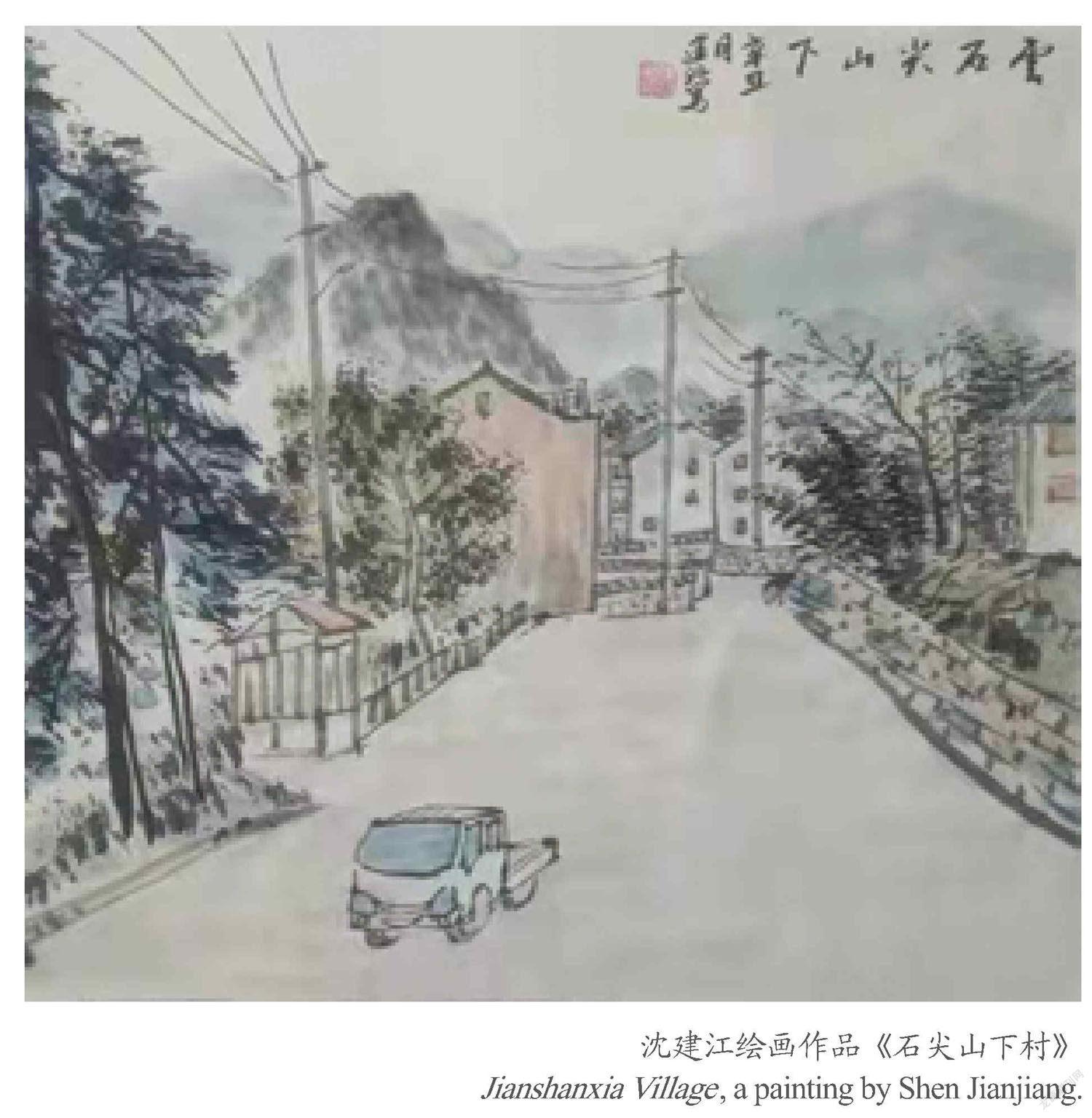
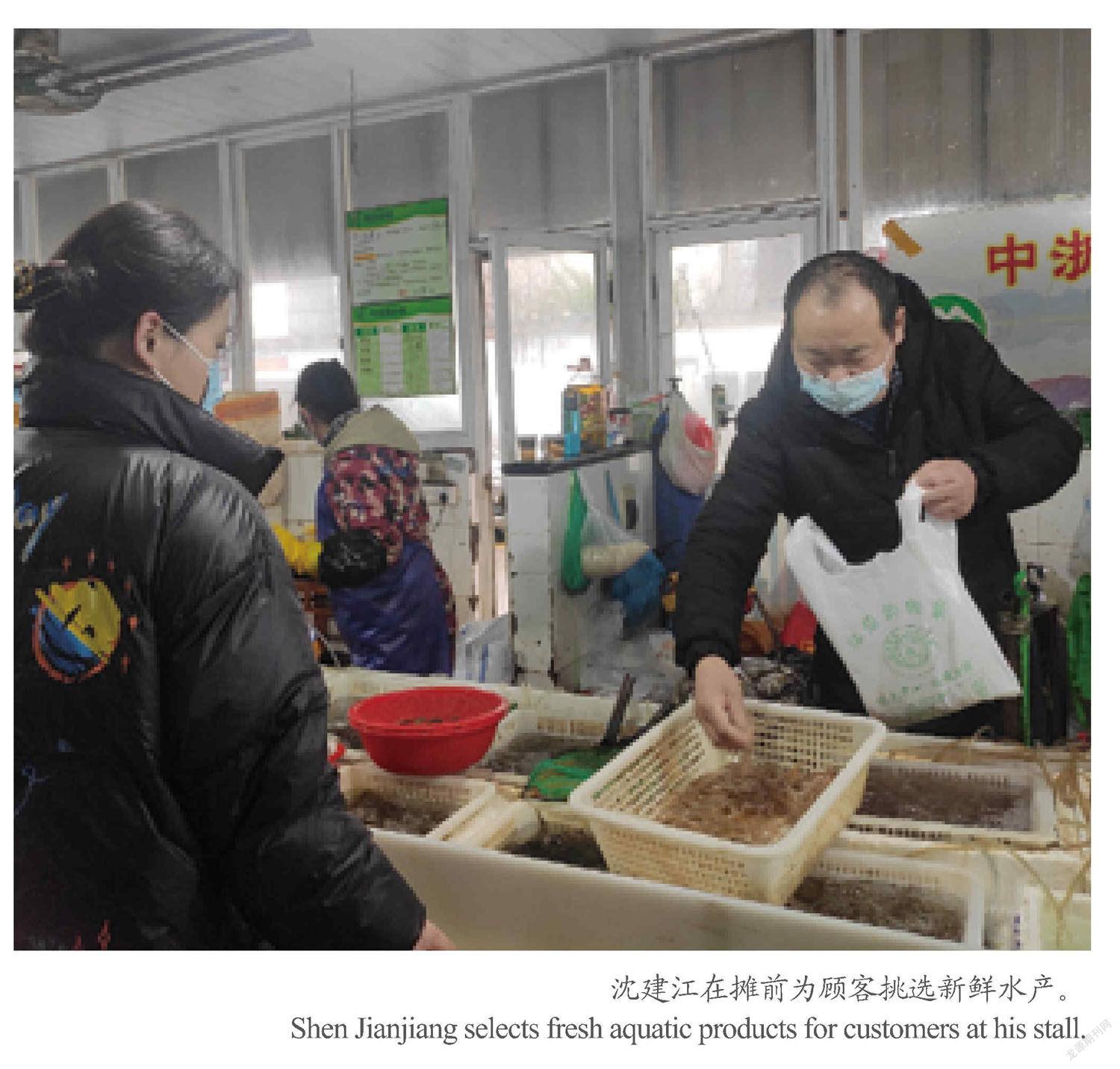
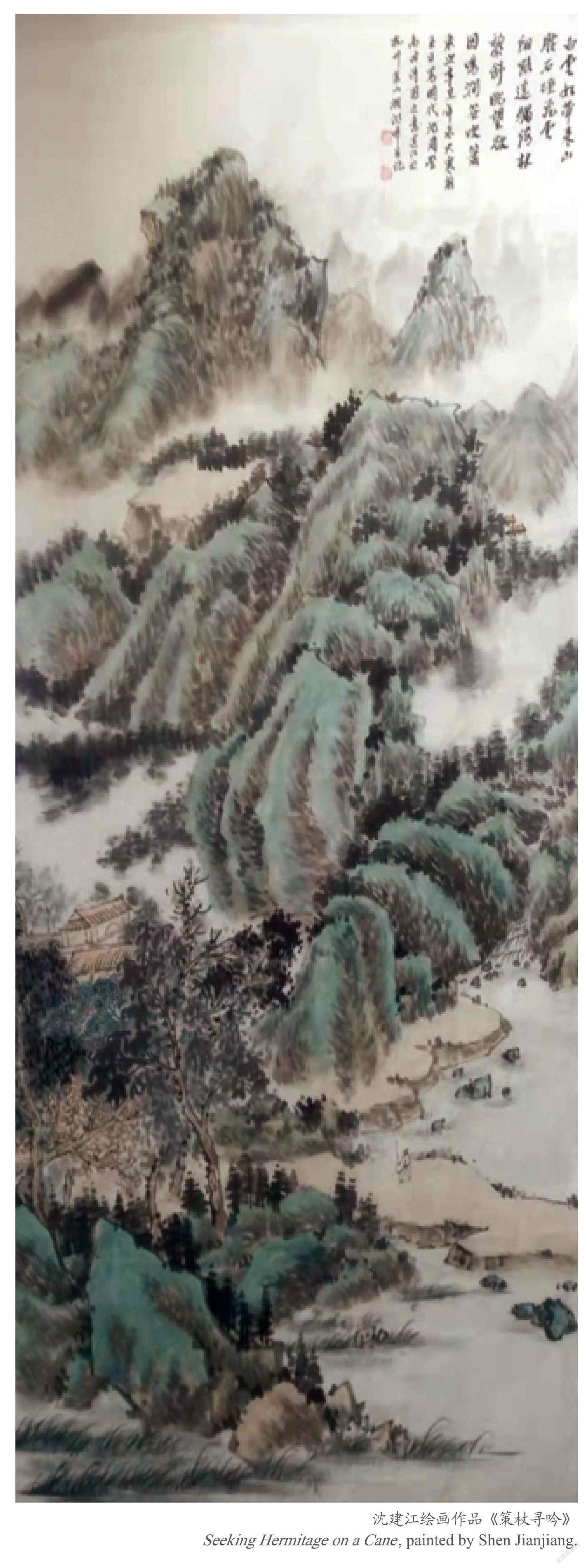
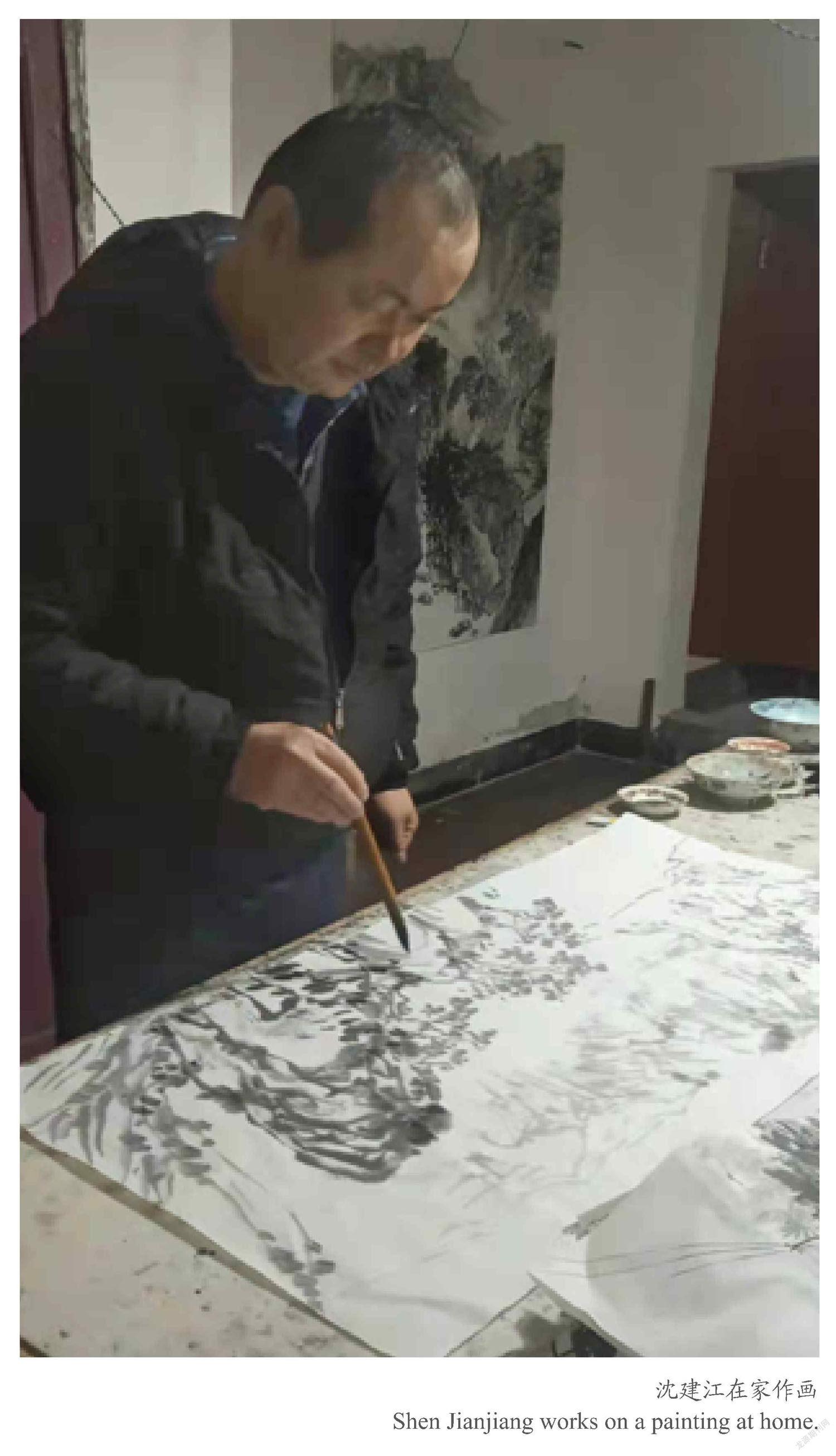
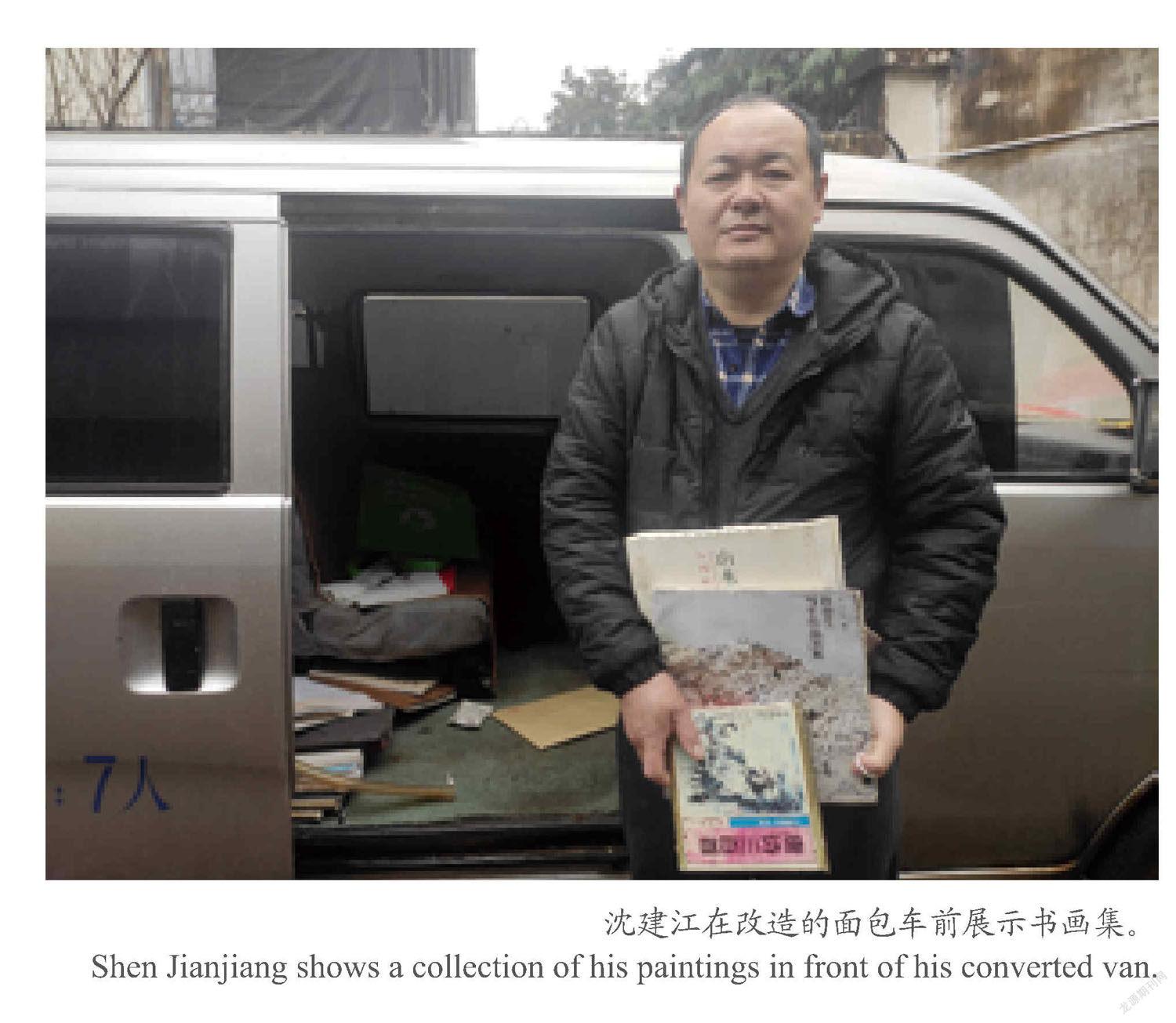
沈建江有着双重身份 :杭州萧山育才农贸市场的一位水产摊贩,他出售的水产广受当地消费者欢迎,一双粗糙的饱经风霜的手,左手大拇指上有因鱼刺多次扎入导致的增生硬条;富有诗情画意的山水画家,去年11月,他的作品《溪山雅居》入选杭州市第五届“两宋论坛”书画联展。
这两个毫无相关的身份体现在沈建江的身上,以至于人们对他一直特别好奇。
他白天卖鱼,养家糊口,为的是家庭的温饱和生存;晚上画画,追求艺术,寻的是内心的安宁和快乐。
一边汲汲于生,一边追逐梦想;一面是脚下的便士,一面是心底的月亮。
水产摊前是称职的摊贩
沈建江今年54岁,杭州萧山本地人。在从事水产生意前,曾是一名药厂销售。1997年,公司倒闭,他下岗了。
打了几年零工后,儿子出生,他意识到稳定的收入对小家庭的重要性。2000年,他听从朋友建议,投入所有积蓄在育才农贸市场摆了个水产摊。
沈建江知道万事开头难,但他没想到这么难。
没钱买车,沈建江就要每天凌晨1点半起床,踏着沉沉夜色,顶着凛冽寒风,到西门农贸市场等专门接送的面包车去进货。
他至今记得,那年冬天的一个极寒雪天,他一人在雪地里拉着5个两斤重的借来的蟹筐,一直走、一直走,走了好久还没看到面包车。面对似乎没有尽头的那条路,坚强的汉子红了眼眶。
凌晨3点,面包车回程。车厢内人货混装,沈建江把买来的水产放好后,爬进车厢,寻到一个空角落,蜷缩着坐在充满鱼腥味的车厢内,脸埋在棉服领子里,阖眼打个盹。
4点多,沈建江回到农贸市场,收拾整理好水产后,就忙着招呼客人。中午实在累了就在椅子上靠一下,晚上7点回家。每天睡眠时间不足6小时,没有周末和年假。
沈建江习惯了日复一日的早起晚归,习惯了在黑夜中踽踽独行,习惯了鼻尖萦绕不绝的鱼腥味。
“那段日子是真的艰难,每次进货回来全身都是湿漉漉的,也没得换。难过的时候就在脑海中盘算着每天能赚多少钱,就能暂时忘掉辛苦和烦恼。”
沈建江说,那几年他苍老了许多。但正是这样的苦累,磨砺了他的心智,也为他坚持学习国画奠定了基础。
为梦想从未放弃绘画
生意上了轨道,沈建江在闲暇时会和其他摊主一起打打牌、喝喝酒,但很快就觉得无趣,“感觉没什么意思,心里空落落的”。直到有一天,妻子屈雁对他说:“你要不去找个健康的爱好?”
一语惊醒梦中人,沈建江想起了他儿时的绘画梦想。
小学三年级的时候,学校有绘画课。“我发现,毛笔蘸墨加水稀释后画出来的画是淡淡的,和我们湘湖远山的景色一模一样。”沈建江很惊奇,“原来毛笔画出的画才是真山真水。”
自此,沈建江开始在家自学山水画。无人深入教学,他就跑到新华书店去找画册,找到一本《马骀画宝》,爱不释手,就饿了半个月,把早饭钱省下来买下人生第一本画册。没有宣纸用来临摹,他就把家里所有能找到的纸张拿来画。
就这样,沈建江自学到初中毕业,“那时候我在学校已经小有名气,但水平肯定不够。我就央求我爸帮我报个美术班,他看我实在喜欢,就让我去学学看。”父亲帮沈建江报了个10天的绘画班,在那里,他遇到了萧山有名的画家王不瑕老师。王老师带他接触到真正的中国画。
1988年,沈建江毕业后开始工作,他刚开始还在坚持画画,但后来逐渐忙起来,加上周围人“你画画又不能当饭吃”的唱衰声音,他慢慢搁置了画笔。
但是,这份热爱已然深种。
2011年,沈建江决定重拾画笔。他打听到,市场里一个卖菜阿姨家楼上住着一位画家,就托这位阿姨领他上门拜访。这位画家对他说:“像你这种卖鱼的学国画只是浪费时间,学不好这種高雅艺术的,劝你别学了。”
被泼了一盆“冷水”,沈建江感到十分难受且不服气:“凭什么卖鱼的就不能学国画?我偏要学给你看。”他又去几家绘画培训机构询问,却被高昂的价格吓退,“赚来的都是辛苦钱,吃不消这么搞”。
那一年,沈建江心情极其低落。自己从事的“脏乱臭”职业与“阳春白雪”的山水画之间看似不可调和的矛盾,身边人的不看好、不理解,令他颇受煎熬,他一度想放弃绘画。
一边是琐碎的生活 一边是诗画和远方
苦心人,天不负。
2013年,萧山农民书画协会搬到了育才路,沈建江每天去农贸市场的时候都会经过那里,牌匾上的“农民”“书画”两个词吸引了他。但有了前几次的教训,他只是在门口徘徊,不敢进入。
几天后,热爱战胜迟疑,沈建江终于下定决心走了进去,书画协会会长王柏根亲自接待了他。看完沈建江的画作,王柏根对他说:“只要你继续努力,你肯定会画得更好,我们欢迎你的加入!”不到一周,王会长就帮沈建江办好了会员证,让他“插班”进去学习,师从萧山有名画家赵大安。
沈建江绘画的主题大多是“美丽乡村”。起先是因为他要照顾生意,去不了很远的地方,只能就近写生。后来他渐渐发现,杭州的农村造得很好,“一排排小别墅,干净又漂亮,我就下定决心要画杭州美丽乡村,希望能够传播给更多人”。
今年,已经是沈建江在萧山农民书画协会的第十个年头了。“沈建江的绘画技法越来越成熟,他的画很有气势,很宏伟,又融入了现代的元素,能够展示自己的家乡美。”萧山农民书画协会办公室主任项红红告诉笔者。
项红红透露,沈建江很勤奋,每到上课那天,他早上9点多干完活就赶过去,吃完午饭会单独留下来再练一会。“有老师建议他再学学别的花鸟画、农民画,他说自己不学了,只想专注画山水画,把一门技艺学精、学好。”项红红说。
现在,沈建江每天都画画。晚上7点多从农贸市场回到家,他做的第一件事情就是画画,直到晚上11点。“国画要分染,等一层颜色干了再上另一层。所以我一般都先画底色,再去烧饭,再回来上第二层颜色。”
有時候,沈建江因为画画太过忘我,会忘记饭菜还在锅里,等他发现的时候,饭菜已经焦了。妻子屈雁每次都笑:“你可真是废寝忘食了!”尽管如此,沈建江还是觉得他每天用在绘画上的时间太少。
两年前,沈建江买了一辆新的面包车,他将其改装了一番,将车前部变成他的“流动书房”。每当他空闲时,他就会跑到车上翻看画册书,思索绘画技法,甚至看《唐诗三百首》,琢磨什么叫“诗情画意”。沈建江常常说:“做自己喜欢的事,再忙都能挤出时间。”
沈建江由衷感叹:“画画的时候我最开心,像是找到了最丰盈真实的自我,那种从内而外的满足感是难以形容的。我年复一年、枯燥无味的生活因为画画变得多姿多彩、有滋有味。”
From a Fish Vendor to a Painter
By Xu Ziying
Shen Jianjiang, a vendor in Xiaoshan district, Hangzhou, is leading a double life. With coarse, weathered hands, Shen sells aquatic products in the local market in the daytime and does some landscape painting at night — last November, his work Xishan Yaju (Elegant Dwellings amid Brooks and Mountains) was selected into the Hangzhou’s Fifth Painting and Calligraphy Exhibition at the Northern and Southern Dynasty Forum.
The dual identity of the 54-year-old Xiaoshan native has triggered much public curiosity: how does Shen manage to support his family and chase his artistic dream in the meantime, like a non-fictional Moon and Sixpence?
Before taking up the current business, he was once a salesman with a pharmaceutical factory, which closed down in 1997 and he was thus laid off.
He did some part-time jobs afterwards until his son was born, which made him realize he must secure a steady income to provide for his family. In 2000, advised by a friend of his, he traded all his savings for a fish stall at a local market.
He knew it was never easy to start, but he didn’t expect it to be this hard.
Because he couldn’t afford a car, Shen had to get up at 1:30 am every morning, walking through the freezing wind of the night to wait for a van at another Market, with which he could replenish his stock.
There was an extremely cold winter day that Shen clearly remembers to this day: towing five 1-kg crab baskets in the snow alone, he kept walking and walking on the seemingly endless road with welled up eyes.
At 3:00 am, while the van returned with a full mixed load of odorous purchases and their owners, Shen would use that short period of time to take a quick nap on the car.
At a little past 4:00 am, Shen got back to his market, and quickly tidy up the aquatic products for sale before receiving customers. At noon he would have a little rest in the chair if he was too tired. He usually went home at 7:00 pm, and got a less-than-6-hour sleep. No weekends or annual leaves.
Gradually, Shen grew used to the days of getting up early and returning home late, walking alone in the dark, and surrounded by the lingering smell of fish. “Those days were so difficult that every time I finished with my stock, I would get soaked all over and with no dry clothes to change into. When things got too bad, I would think about how much money I’d made that day to take my mind off the troubles and pains I was suffering.”
Those years have aged him a lot, but Shen believed it was this hard time that sharpened his mind and will, which mentally supported him throughout his learning of Chinese painting.
After his business went on track, Shen Jianjiang would usually hang out with other vendors, and it bored him very soon. One day, his wife suggested, “What about finding yourself a nice hobby?”
It suddenly reminded him of how he loved painting as a child. Since he got to know paining at the third grade, Shen had been teaching himself to draw landscapes at home. With no instructors, he went to the local Xinhua Bookstore and bought his first picture book with his pocket money. And his self-taught drawing lessons continued until he graduated from junior high.
“I was a little famous back then as a good painter, but absolutely not good enough. So I begged my father to sign me up for an art class, which he did, and he even encouraged me to pursue my passion.” During that ten-day course, he met a well-known Xiaoshan painter Wang Buxia, who introduced him to authentic Chinese painting.
Shen took a job after he graduated in 1988, and kept paining in his spare time at first. But when he got busier than before, and surrounded by discouraging voices (“you can’ really live on your amateur painting, can you?” was one he frequently heard), he slowly dropped his paining brush.
However, his affection for painting could not be gone that easily. In 2011, Shen decided to pick up painting again, only to be ridiculed by a local painter who claimed that for someone selling fish for a living, learning an elegant art like Chinese painting is nothing but a waste of time. Unwilling to budge, Shen attempted to sign up for some course at art training schools, but backed down because of the high tuitions. That year, he was really depressed, on the verge of giving up painting once and for all.
But fate just wouldn’t let him. In 2013, Xiaoshan Farmers’ Calligraphy and Painting Club was relocated to Yucai Road, which Shen curiously passed every day on his way to work but too was afraid to get inside. Several days after, he finally summoned up courage and entered, where Wang Bogen, the president, received him, examined his works, and encouraged him. “As long as you keep working hard, you will be doing much better. We would love for you to join us,” Wang said. He got the membership certificate ready for Shen in less than a week, who was able to enter the class taught by the famous Xiaoshan painter, Zhao Da’an.
The major themes of his paintings are always the captivating countryside, because he could not go much further for landscape sketching than his business would allow him. And he grew attracted to the tidy and beautiful rural areas in Hangzhou, which he loved to present through his paintings to the rest of the world.
The year 2022 marks a full decade when Shen first joined the club. “He is getting much more skillful, which delivers the grandeur and modern beauty of his hometown,” Xiang Honghong, the club’s director of general office, said. “And he is also very hardworking and focused.”
Now Shen paints every day. After 7:00 pm when he gets home from a day’s work, the first thing he does is pick up his paint brush. Sometimes he is so concentrated in his painting that he forgets to eat or sleep.
Nevertheless, Shen is still worried that the time he spends on painting is far from enough. Two years ago, he bought a new van, which he turned into his “mobile study”. Whenever he is free, he will get inside the car to browse some painting books while thinking about painting techniques. He even refers to the Three Hundred Tang Poems to figure out what exactly is “poetic”.
“For the things you love doing, you can always squeeze in a few sessions on a busy day,” said Shen. “I’m happiest when I’m painting. It is like finding your most abundant and true self, and you can feel the profound satisfaction within. My boring life has repeated itself year after year, and now it finally becomes so colorful, thanks to painting.”
Bit by bit, Shen Jianjiang is no longer satisfied with only mastering some simple techniques. He wants to be trained professionally at an academy of fine arts, so as to render China’s natural landscape, especially the beautiful countryside of Hangzhou, in a more refined way. He is also planning an art exhibition, if chances were offered, for which he has already thought of a name: “From a Fish Vendor to a Painter”. ![]()
———沈阳北行农贸市场

